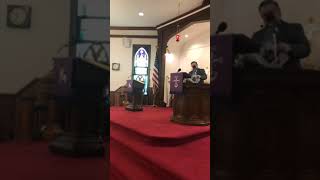When Jesus calls Himself the “Son of Man,” He’s not just emphasizing His human nature. He is referring to the prophecy in Daniel wherein the Ancient of Days gives the Son of Man “dominion and glory and a kingdom, that all peoples, nations, and languages should serve him; his dominion is an everlasting dominion, which shall not pass away, and his kingdom one that shall not be destroyed” (Daniel 7:13–14). The people Jesus list are very specific. The chief priests are high ranking priests who are qualified to enter the Holy of Holies once a year. Although the Levitical law does not allow for more than one high priest at a time, the turmoil during the four hundred years of silence wreaked havoc with the priest system, and these “chief priests” are probably priests with significant political power. Scribes—from the Greek root word grammateus—are scholars of the Mosaic Law. It was the scribes who added the Mishnah—the supplemental oral law that Jesus condemns the Pharisees for following. Elders–from the Greek root word presbuteros—are significant players in the Jewish legal system. These three—the chief priests, scribes, and elders—make up the Sanhedrin, the legal and political branch of Judaism. Although God had ordained the creation of the Sanhedrin (Numbers 11:16–18), this iteration is not so honorable. It is they who will turn Jesus over to the Romans to be crucified (Mark 14:53–65). “Suffer” is from the Greek root word pascho which means to experience an event through one’s senses. “Pasach” refers to Passover, and “Pascha” is what the Greek- and Latin-speaking Christians called Easter. “Rejected” is from the Greek root word apodokimazo and means to be repudiated. This prophecy came true when the Jewish leadership told Pilate they had no king but Caesar (John 19:15). “Kill” is from the Greek root word apokteino. The use is unusual. When Jesus heals Jairus’ daughter, He says she is merely sleeping (Mark 5:39). When Jesus tells the disciples it is time to see Lazarus, He first says that he has fallen asleep (John 11:11). The phrase is also used of dead saints (Matthew 27:52), even after the ascension (1 Corinthians 15:6; 1 Thessalonians 4:14). When a believer dies, it is no more

February 28, 2021 Live Stream
Have this attitude in yourselves which was also in Christ Jesus, who, as He already existed in the form of God, did not consider equality with God something to be grasped, but emptied Himself by taking the form of a bond-servant and being born in the likeness of men. And being found in appearance as a man, He humbled Himself by becoming obedient to the point of death: death on a cross. — Philippians 2:5-8 (NASV)